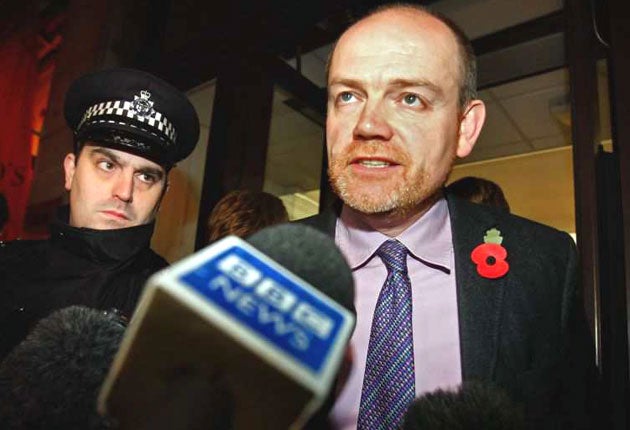BBC bows to its critics (again)
Jonathan Ross is suspended for 12 weeks over lewd calls; Radio 2 controller quits, taking blame for editorial failures; Governing body orders sweeping review of standards

Your support helps us to tell the story
From reproductive rights to climate change to Big Tech, The Independent is on the ground when the story is developing. Whether it's investigating the financials of Elon Musk's pro-Trump PAC or producing our latest documentary, 'The A Word', which shines a light on the American women fighting for reproductive rights, we know how important it is to parse out the facts from the messaging.
At such a critical moment in US history, we need reporters on the ground. Your donation allows us to keep sending journalists to speak to both sides of the story.
The Independent is trusted by Americans across the entire political spectrum. And unlike many other quality news outlets, we choose not to lock Americans out of our reporting and analysis with paywalls. We believe quality journalism should be available to everyone, paid for by those who can afford it.
Your support makes all the difference.The BBC has ordered a fundamental review of taste and decency standards across the network in an attempt to end the row about lewd prank phone calls that has engulfed the corporation.
The controller of Radio 2, Lesley Douglas, one of the most influential figures in the radio and music industries, was forced to resign, while Jonathan Ross, the highest-paid man in British broadcasting, has been suspended for 12 weeks without pay. His Radio 2 presenting colleague Russell Brand resigned on Wednesday.
The BBC Trust ordered an on-air apology to licence fee-payers for "serious and deliberate breaches" of editorial guidelines, and asked the director general, Mark Thompson, to write a personal apology for the scandal. He declined to comment on the future of more junior staff involved but promised to conduct a review of broadcasting guidelines.
The announcements came after six-and-a-half hours of crisis talks between Mr Thompson and the BBC Trust, following the latest in a succession of scandals since the 2004 Hutton report, which forced the resignations of the then director general Greg Dyke, chairman Gavyn Davies and reporter Andrew Gilligan.
The BBC had initially tried to play down the latest furore, which was caused by four messages left by Ross and Brand on the answering machine of the 78-year-old former Fawlty Towers actor Andrew Sachs, discussing his granddaughter's sex life. But by yesterday evening the BBC had received more than 35,000 complaints about the broadcast, and it had become clear that at least one senior resignation would be required to contain the scandal.
The Independent disclosed yesterday that Ms Douglas was considering her position. In a statement last night, she said: "The events of the last two weeks happened on my watch. I believe it is right that I take responsibility for what has happened." In her resignation letter to Mr Thompson, Ms Douglas acknowledged that the past week had been a "painful one for the BBC and particularly for BBC Radio 2", writing: "Over the 23 years of my career at the BBC I have enjoyed a deep love and respect for both the audience and the BBC. It is with enormous regret that I have decided to resign as Controller of BBC Radio 2, BBC 6 Music and of Popular Music. This is my decision alone."
Mr Thompson said he accepted the decision with "real sadness". He said that Ross, who earns about £6m a year, had been suspended for three months without pay. "Jonathan Ross's contribution to this edition of the Russell Brand show was utterly unacceptable and cannot be allowed to go uncensored or without sanction," said Mr Thompson.
Last night's edition of Never Mind the Buzzcocks was also cancelled as it featured Brand – a subsequent version of the show was broadcast in its place. The BBC said it had no plans to show the program at a later date.
The BBC announced a raft of measures it was taking to prevent something similar happening again, including a review of compliance procedures across radio output, and a "study into where the appropriate boundaries of taste and standards should lie across all BBC output". Sessions will be held with senior staff on the "lessons to be learnt". The director of BBC audio and music will also "ensure that all programmes are re-assessed for editorial risk" and those with high risk will have "additional... oversight".
Join our commenting forum
Join thought-provoking conversations, follow other Independent readers and see their replies
Comments